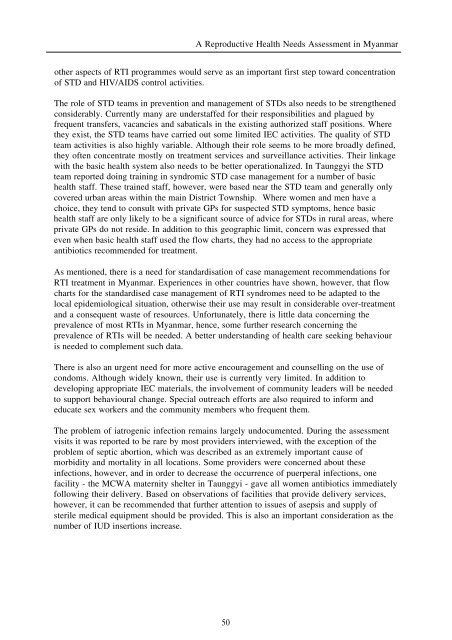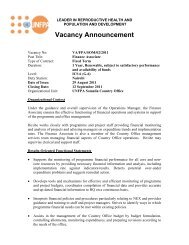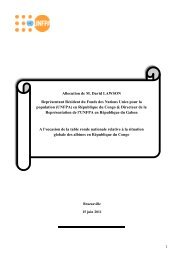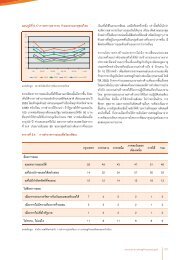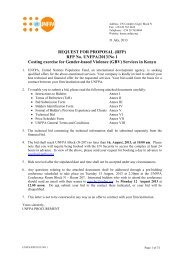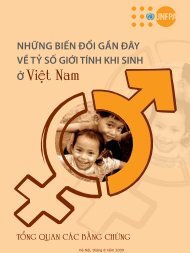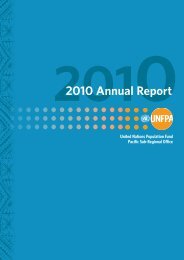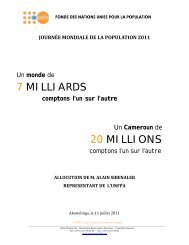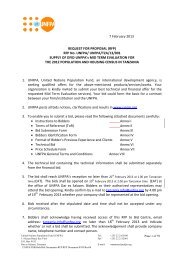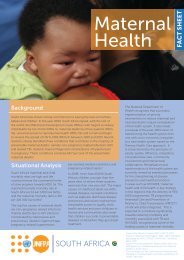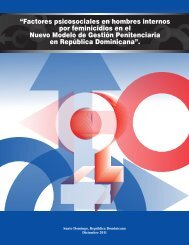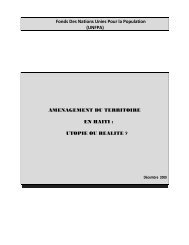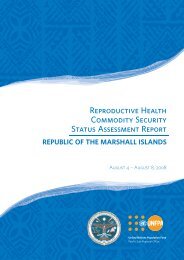A reproductive health needs assessment in Myanmar
A reproductive health needs assessment in Myanmar
A reproductive health needs assessment in Myanmar
Create successful ePaper yourself
Turn your PDF publications into a flip-book with our unique Google optimized e-Paper software.
A Reproductive Health Needs Assessment <strong>in</strong> <strong>Myanmar</strong><br />
other aspects of RTI programmes would serve as an important first step toward concentration<br />
of STD and HIV/AIDS control activities.<br />
The role of STD teams <strong>in</strong> prevention and management of STDs also <strong>needs</strong> to be strengthened<br />
considerably. Currently many are understaffed for their responsibilities and plagued by<br />
frequent transfers, vacancies and sabaticals <strong>in</strong> the exist<strong>in</strong>g authorized staff positions. Where<br />
they exist, the STD teams have carried out some limited IEC activities. The quality of STD<br />
team activities is also highly variable. Although their role seems to be more broadly def<strong>in</strong>ed,<br />
they often concentrate mostly on treatment services and surveillance activities. Their l<strong>in</strong>kage<br />
with the basic <strong>health</strong> system also <strong>needs</strong> to be better operationalized. In Taunggyi the STD<br />
team reported do<strong>in</strong>g tra<strong>in</strong><strong>in</strong>g <strong>in</strong> syndromic STD case management for a number of basic<br />
<strong>health</strong> staff. These tra<strong>in</strong>ed staff, however, were based near the STD team and generally only<br />
covered urban areas with<strong>in</strong> the ma<strong>in</strong> District Township. Where women and men have a<br />
choice, they tend to consult with private GPs for suspected STD symptoms, hence basic<br />
<strong>health</strong> staff are only likely to be a significant source of advice for STDs <strong>in</strong> rural areas, where<br />
private GPs do not reside. In addition to this geographic limit, concern was expressed that<br />
even when basic <strong>health</strong> staff used the flow charts, they had no access to the appropriate<br />
antibiotics recommended for treatment.<br />
As mentioned, there is a need for standardisation of case management recommendations for<br />
RTI treatment <strong>in</strong> <strong>Myanmar</strong>. Experiences <strong>in</strong> other countries have shown, however, that flow<br />
charts for the standardised case management of RTI syndromes need to be adapted to the<br />
local epidemiological situation, otherwise their use may result <strong>in</strong> considerable over-treatment<br />
and a consequent waste of resources. Unfortunately, there is little data concern<strong>in</strong>g the<br />
prevalence of most RTIs <strong>in</strong> <strong>Myanmar</strong>, hence, some further research concern<strong>in</strong>g the<br />
prevalence of RTIs will be needed. A better understand<strong>in</strong>g of <strong>health</strong> care seek<strong>in</strong>g behaviour<br />
is needed to complement such data.<br />
There is also an urgent need for more active encouragement and counsell<strong>in</strong>g on the use of<br />
condoms. Although widely known, their use is currently very limited. In addition to<br />
develop<strong>in</strong>g appropriate IEC materials, the <strong>in</strong>volvement of community leaders will be needed<br />
to support behavioural change. Special outreach efforts are also required to <strong>in</strong>form and<br />
educate sex workers and the community members who frequent them.<br />
The problem of iatrogenic <strong>in</strong>fection rema<strong>in</strong>s largely undocumented. Dur<strong>in</strong>g the <strong>assessment</strong><br />
visits it was reported to be rare by most providers <strong>in</strong>terviewed, with the exception of the<br />
problem of septic abortion, which was described as an extremely important cause of<br />
morbidity and mortality <strong>in</strong> all locations. Some providers were concerned about these<br />
<strong>in</strong>fections, however, and <strong>in</strong> order to decrease the occurrence of puerperal <strong>in</strong>fections, one<br />
facility - the MCWA maternity shelter <strong>in</strong> Taunggyi - gave all women antibiotics immediately<br />
follow<strong>in</strong>g their delivery. Based on observations of facilities that provide delivery services,<br />
however, it can be recommended that further attention to issues of asepsis and supply of<br />
sterile medical equipment should be provided. This is also an important consideration as the<br />
number of IUD <strong>in</strong>sertions <strong>in</strong>crease.<br />
50


